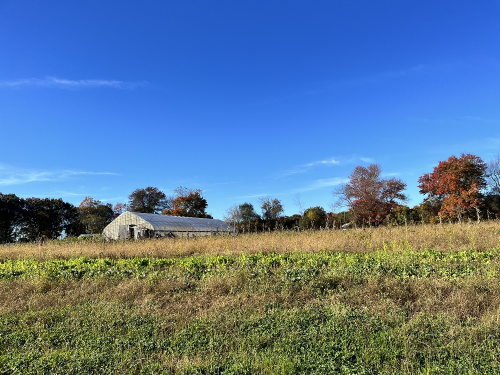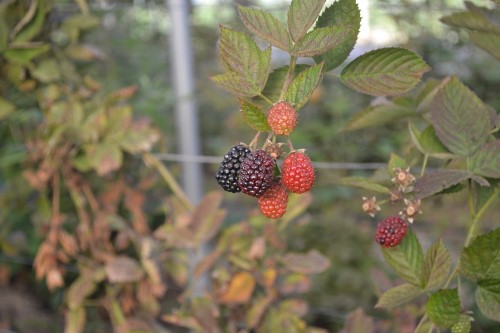Nov 21, 2023
$3.5 million grant aids organic growers in food safety efforts
The University of Rhode Island and The Organic Center, along with co-investigators from three other universities, were recently awarded a $3.5 million USDA Organic Agriculture Research and Extension Initiative (OREI) grant to help reduce food safety barriers for organic specialty crop growers.
The project — “Developing Risk-Assessment, Educational and Communication Tools to Lower Food Safety Barriers for Organic Specialty Crop Growers” — arose from feedback The Organic Center (TOC) received from Organic Trade Association members.

“Stakeholder engagement through TOC’s partnership with the Organic Trade Association revealed that food safety management was particularly challenging for organic farmers for various administrative and operational reasons,” said Dr. Amber Sciligo, The Organic Center’s director of science programs.
“Hearing a need for a deeper dive into this topic, The Organic Center pulled together a team of scientists and food safety experts to submit an OREI planning grant proposal in 2020, which, if funded, would allow us to conduct a national needs assessment and develop a research program that would address the biggest challenges identified in that needs assessment,” she said.
The planning grant was indeed awarded, and Sciligo and her co-lead, Dr. Patrick Baur, assistant professor in sustainable agriculture and food systems at the University of Rhode Island, conducted the national needs assessment. They found that the majority of organic growers surveyed who currently or had previously held pre-harvest food safety certifications reported administrative or operational barriers in complying with both National Organic Program (NOP) and food safety standards.
 The organic growers surveyed said that the most significant barriers to meeting both NOP and food safety requirements were compliance costs, water testing for microbial pathogen contamination, effect of livestock proximity, administrative requirements (e.g. recordkeeping) and the food safety risk of compost and other organic soil amendments.
The organic growers surveyed said that the most significant barriers to meeting both NOP and food safety requirements were compliance costs, water testing for microbial pathogen contamination, effect of livestock proximity, administrative requirements (e.g. recordkeeping) and the food safety risk of compost and other organic soil amendments.
The planning grant and its resulting needs assessment allowed Baur, Sciligo and their co-investigators to submit a full OREI grant on the topic — and the $3.5 million proposal was awarded this fall.
“This is exciting and big news because it is not common for first submissions to be awarded,” Sciligo said.

“Americans increasingly want organic fruits and vegetables,” Baur said. “They also want food that is safe. We have robust policies designed to deliver safe, organic food through the National Organic Program and the Food Safety Modernization Act. But on the ground, these policy worlds don’t always speak the same language or work together. The burden falls on organic farmers to deal with all the resulting tensions.”
That’s the driving force behind the project.
“We’re going to develop a new food safety management tool designed specifically for organic soil amendments,” Baur said. “And we’re also going to develop a suite of new communication and training tools aimed at the entire fruit and vegetable sector to build a shared language between organic agriculture and the food safety community and help them work better together.”
The grant also supports an in-person event component — a series of 10 regional workshops that will be organized and hosted by The Organic Center.
“We want the workshops to offer a space for knowledge exchange to help get players in the organic supply and regulatory chains on the same page,” Sciligo said. “For instance, it will be helpful if food safety professionals know more about the parts of the NOP that may cause tension with food safety management recommendations and for organic certifiers and technical assistance providers to know more about the food safety regulations/risk management that could cause tension with NOP rules. Administrative burdens may be reduced if all agencies are talking with one another and farmers at the same time.”
The workshops are slated for 2026 and 2027 and will be in the four USDA Sustainable Agriculture Research and Education (SARE) regions, with highly active organic regions like the West having more than one workshop.
 “We expect that challenges to simultaneously comply with food safety regulations and NOP regulations will likely vary by crop and region as food safety risks are impacted by things like climate and typical operation scale and crop composition,” Sciligo said.
“We expect that challenges to simultaneously comply with food safety regulations and NOP regulations will likely vary by crop and region as food safety risks are impacted by things like climate and typical operation scale and crop composition,” Sciligo said.
The Organic Center will also host two webinars for organic certifiers and food safety auditors in 2026 and 2027 to share the project’s results, explain how to use the decision-making tool for organic soil amendments, and preview a series of online training modules.
Sciligo said it’s important to note that this new grant did not arise from worries about food safety in organic specialty crop production.
“The major concern here is not that organic farmers won’t continue to grow food safely but rather that they won’t continue to grow food that is certified organic,” she said. “To ensure that we are able to keep growing the amount of organic acreage in the US, we are trying to alleviate barriers that farmers face in compliance with both food safety and organic regulations — we don’t want them to have to choose. In the case of limited resources (money, time, knowledge), we’ve heard farmers say that they will choose to get certified for their food safety management over organic certification. … We want organic farmers to be able to remain certified while also satisfying food safety risk mitigation requirements.”
A full description of the $3.5 million OREI grant is on the USDA’s website.






